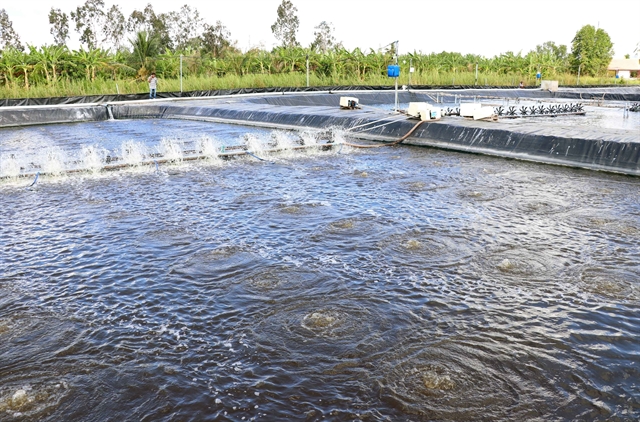 Society
Society

 |
| Rice fields in Trần Văn Thời District, Cà Mau Province, that have been turned into vegetable farms in the ongoing dry season. – VNA/VNS Photo Huỳnh Anh |
CÀ MAU – Farmers in Cà Mau Province are achieving higher profits by rotating rice with short-term crops, thus conserving water during the dry season.
The country’s southernmost province primarily relies on groundwater and rainfall as it lacks large rivers originating from the Mekong River.
Bordered by the sea on three sides, it is also among the Cửu Long (Mekong) Delta provinces most severely affected by saltwater intrusion during the dry season.
To mitigate these challenges, local authorities have encouraged rice farmers to switch to drought-resistant crops during the dry months.
In Trần Văn Thời District, one of the hardest-hit areas, many farmers have begun cultivating vegetables this season and earning high profits.
Nguyễn Văn Vĩnh, a farmer in Trần Hợi Commune, has planted 500 gourd vines on his one-hectare rice field and started harvesting, and he expects to earn VNĐ100,000 (US 4) per plant from selling the fruit. He is also growing watermelon, and the crop is thriving due to the ample water he has stored in his ditches.
"The profits from these crops are four times higher than from rice," he said.
"After the last rice harvest, my family switched to gourds and watermelons, which have proven far more lucrative."
Trần Hợi Commune relies on rainfall for agricultural production, making farmers vulnerable to irrigation water shortages in the dry season.
Local authorities, therefore, encourage a shift to drought-resistant crops, which not only conserve water but also fetch greater profits.
In Trần Văn Thời District, approximately 700 hectares of rice fields have been converted into vegetable gardens, particularly in Trần Hợi, Khánh Hưng and Khánh Bình Đông communes.
The late end to this year’s rainy season has left ample fresh water in local canals, prompting farmers to plant vegetables early after the last rice harvest. According to the district’s Bureau of Agriculture and Rural Development, most vegetable crops are flourishing and producing higher yields than in previous years.
Nguyễn Việt Khái, deputy head of the bureau, noted that cultivating a third rice crop in the district is inefficient due to the high water demand.
"We have advised farmers against growing a third rice crop and encouraged them to switch to vegetables, which are more suited and profitable."
Farmers who cultivate vegetables year-round enjoy a stable income.
To further support this, local authorities have encouraged farmers to utilise land in their gardens, orchards and around houses and shrimp ponds for vegetable farming.
In Phú Tân District, nearly 80 hectares of vegetables are being grown under this model.
Phạm Thị Gọn, a farmer in the district’s Cái Đôi Vàm Town, cultivates green mustard, lettuce, morning glory, spring onion, and Chinese chive on 500 square metres of land around her house.
She earns VNĐ5-10 million (US$200-400) per month selling her produce at a local market.
"Consumers prefer buying vegetables grown nearby rather than those from distant locations," she said. "Many local residents come directly to my house to buy fresh vegetables."
Trần Hữu Nghi, deputy chairman of the Cái Đôi Vàm Town Farmers Association, said the association is promoting this model to help farmers boost their incomes.
Preventing saltwater intrusion
The People’s Committee of the province has directed relevant departments, agencies, and localities to intensify efforts to prevent and control saltwater intrusion and drought this season.
Authorities are closely monitoring weather conditions and hydro-meteorological forecasts, disseminating information to farmers and proactively taking disaster prevention measures.
Nguyễn Thanh Tùng, head of the province’s Irrigation Sub-department, said the province has been building new irrigation systems and upgrading existing infrastructure to protect agricultural production.
"The province’s embankments and sluices [will] prevent saltwater intrusion and store freshwater, ensuring resilience against drought and salinity."
Saltwater intrusion is expected to peak between February and April. While the severity of this year’s dry season is not on a par with the historic 2015-16 and 2019-20 seasons, it will be higher than normal, according to the National Centre for Hydro-Meteorology Forecasting.
Local meteorologists report that saltwater is encroaching deeper into freshwater areas, and salinity levels are on the rise.
Nguyễn Út Em, deputy head of the province’s Plant Protection and Cultivation Sub-department, urged farmers to follow recommended planting schedules, avoid growing crops in water-scarce areas, and switch to suitable alternatives.
He also advised them to monitor crop and livestock diseases closely and use fresh water efficiently for both farming and household needs.
Farmers in the province have already adopted measures to protect their crops and orchards against saltwater intrusion and the resultant lack of water.
Lê Vũ Phong, a farmer in Trần Văn Thời District’s Khánh Hưng Commune, has 100 green-skin pink-flesh grapefruit trees and 100 guava trees, which have been yielding fruits for two years.
He harvested four tonnes of fruits in the first year and nearly five in the second.
To maintain soil moisture and conserve water, he stores water in his orchard’s ponds, uses automatic irrigation systems and applies organic fertilisers and bioproducts.
Besides, he covers tree roots with water hyacinth and straw, allows grass to grow to retain soil humidity, and prunes branches and excess fruits during warm periods to reduce the stress on the trees.
Trần Văn Thời District now has more than 200 hectares of fruit orchards with high economic value, significantly improving local farmers’ incomes. – VNS




